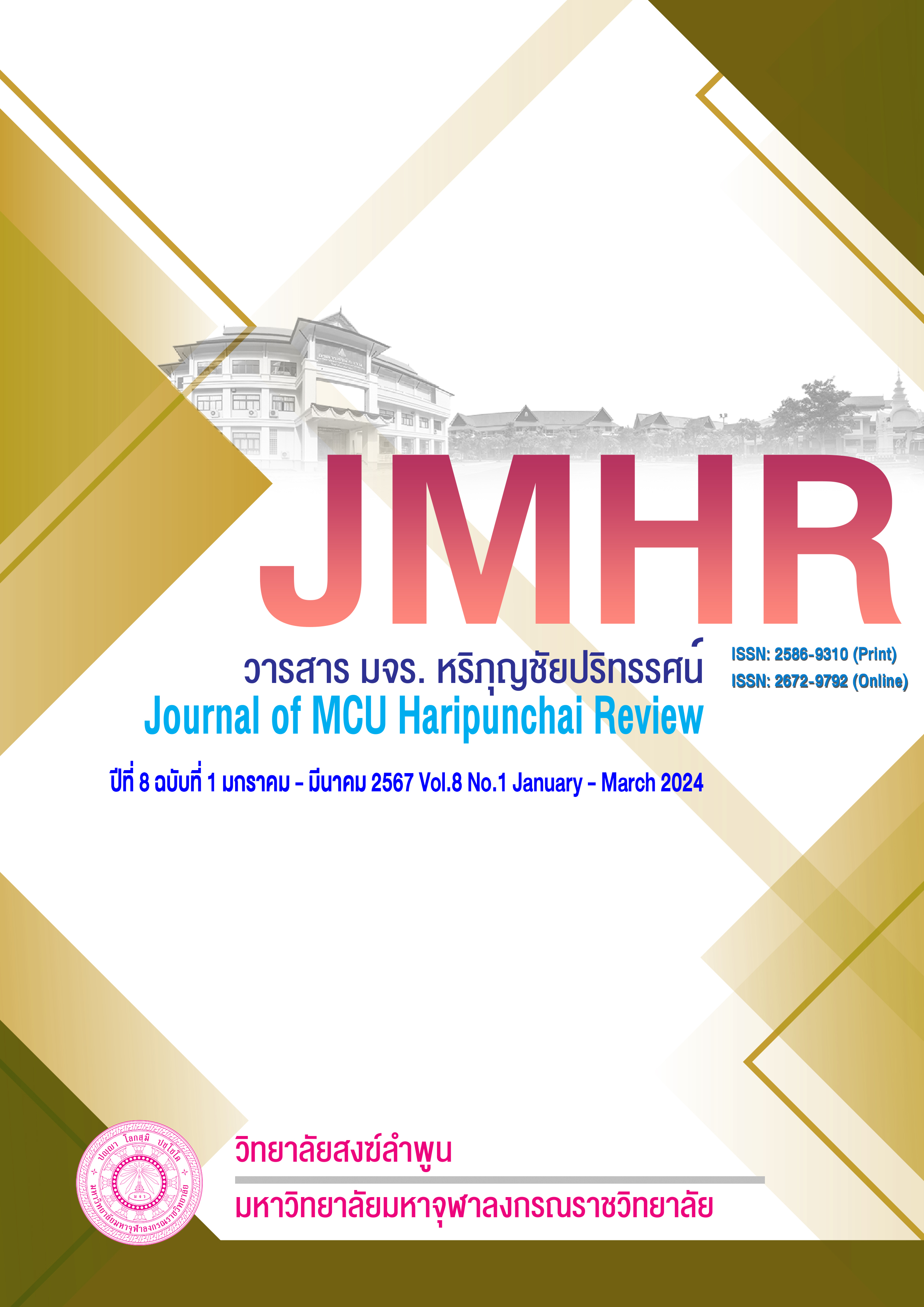Buddhist principles for environmental conservation development
Main Article Content
Abstract
This research article. The objective is to study Buddhist principles in order to maintain balance in the environment. Applying the process of Threefold Dhamma as a principle for conservation or care of all 3 components, namely morality, concentration and wisdom, can be used as a system for preserving the environment in developing human beings to perfection. According to the Buddhist guidelines, 3 aspects are:
1) Physical environment (Sīla) Relationship with the physical environment in a good manner. It will help create a good environment, such as eating good, nutritious food, wearing appropriate clothing, having a safe place to live, and taking care of your body's hygiene. and environmental health.
2) Mental environment (concentration) is the care and development of the mental state. Or this meditation. Emphasis is placed on strengthening the mind to be healthy. There must be 3 characteristics of the mind being created: (1) a strong mind; have ability, (2) mental quality and morality, and (3) mental health It is airy, stress-free, calm, cool, gentle, and soft.
3) Intellectual environment (wisdom) is the care of intellectual health, that is, the enhancement of intelligence to progress. Based on the 4 principles of meditation, divided into 2 main aspects: (1) Kaya Bhavana or Bhavitakaya, which is physical training, namely the physical environment. By using technological knowledge or artistic ability. (2) Sila Bhavana or Bhavit Sila is training in physical behavior, speech that does not harm or cause trouble to others, and self-discipline. and pursue an honest career. (3) Cittabhavana or Bhavitita is training the mind to be complete with mental quality, mental capacity, and good mental health, having a cheerful mind, bright, cheerful, refreshed, full, bright, and peaceful (4) Panyabhavana or Bhavitpanya is training in wisdom, knowing how to think, knowing how to consider. Know how to diagnose, know how to solve problems, and know how to carry out various actions with pure wisdom.
Article Details

This work is licensed under a Creative Commons Attribution-NonCommercial-NoDerivatives 4.0 International License.
References
คณะกรรมการแผนกตารา. (2550). มังคลัตถทีปนีแปล เล่ม 1. พิมพ์ครั้งที่ 15. กรุงเทพมหานคร : มหามกุฏราชวิทยาลัย.
นิธินาถ เจริญโภคราช. (2542). การจัดการสิ่งแวดล้อม. กรุงเทพมหานคร : สถาบันราชภัฏสวนสุนันทา.
พรสวรรค์ ดิษยบุตร. (2549). “ความหมายของสิ่งแวดล้อม”. ใน วิทยาศาสตร์ สำหรับเยาวชน ชีวิตกับสิ่งแวดล้อม (1). นนทบุรี : โรงพิมพ์สหมิตรพริ้นติ้ง.
พระธรรมปิฎก (ป.อ. ปยุตฺโต). (2548). พจนานุกรมพุทธศาสน์ ฉบับประมวลศัพท์. พิมพ์ครั้งที่ 11. กรุงเทพมหานคร : บริษัท เอส. อาร์. พริ้นติ้ง แมส โปรดักส์ จำกัด.
________. ( 2555). พุทธธรรม ฉบับปรับขยาย. พิมพ์ครั้งที่ 32. กรุงเทพมหานคร : สำนักพิมพ์ผลิธัมม์.
________. (2539). ธรรมกับการพัฒนาชีวิต. พิมพ์ครั้งที่ 2. กรุงเทพมหานคร : มูลนิธิพุทธธรรม.
พระพรหมคุณาภรณ์ (ป.อ. ปยุตฺโต). (2549). สุขภาวะองค์รวมแนวพุทธ. พิมพ์ครั้งที่ 11. กรุงเทพมหานคร : โรงพิมพ์สหธรรมิก จำกัด.
พระเมธีธรรมาภรณ์ (ประยูร ธมฺมจิตฺโต). (2538). ธรรมะกับการอนุรักษ์สิ่งแวดล้อม. กรุงเทพมหานคร : บริษัท สหธรรมิก จำกัด.
พระศรีคัมภีรญาณ (สมจินต์ สมฺมาปญฺโ). (2554). สารนิพนธ์พุทธศาสตรบัณฑิต ประจำปี 2554. กรุงเทพมหานคร : โรงพิมพ์มหาจุฬาลงกรณราชวิทยาลัย.
มหาจุฬาลงกรณราชวิทยาลัย. (2539). พระไตรปิฎกภาษาไทย ฉบับมหาจุฬาลงกรณราชวิทยาลัย. กรุงเทพมหานคร โรงพิมพ์มหาจุฬาลงกรณราชวิทยาลัย.
วชิรญาณวโรรส. สมเด็จพระมหาสมณเจ้า. กรมพระยา. (2538). นวโกวาท หลักสูตรนักธรรมชั้นตรี. พิมพ์ครั้งที่ 78. กรุงเทพมหานคร : โรงพิมพ์มหามกุฎราชวิทยาลัย.
_________. (2543). วินัยมุข เล่ม 2 (หลักสูตรนักธรรมชั้นโท). พิมพ์ครั้งที่ 31. กรุงเทพมหานคร : มหามกุฏราชวิทยาลัย.
สำนักงานคณะกรรมการสิ่งแวดล้อมแห่งชาติ. (2530). ความรู้เรื่องสิ่งแวดล้อม. พิมพ์ครั้งที่ 2, กรุงเทพมหานคร : โรงพิมพ์ภาพพิมพ์.
องค์การสหประชาชาติ. (2548). 60 ความสำเร็จขององค์การสหประชาชาติ. กรุงเทพมหานคร : องค์การสหประชาชาติ.
J.A. Simpson and E.S.C. Weiner. (1999). The Oxford English Dictionary. Second edition V5. Clarendon Press Oxford.


